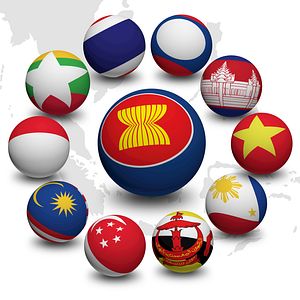The Association of Southeast Asian Nations (ASEAN) is looking to step up its efforts to tackle transnational crime under Malaysia’s chairmanship of the regional grouping, the country’s deputy prime minister said Tuesday following a meeting on the issue in Kuala Lumpur.
Deputy Prime Minister Ahmad Zahid Hamidi, who concurrently serves as home minister, told a press conference at the 10th ASEAN Ministerial Meeting on Transnational Crime (AMMTC) that Southeast Asian states had agreed to several measures to boost their fight against transnational crime.
In a nod to the growing importance of transnational crime as an issue, ASEAN states have agreed to hold the AMMTC annually instead of biannually starting in 2016. Furthermore, Southeast Asian countries have agreed to expand the scope of the issue itself, recognizing the rise of new forms of transnational crime over the past few years. Whilst transnational crime traditionally is limited to eight areas – drug trafficking, terrorism, economic crimes, human trafficking, money laundering, piracy, weapon smuggling and cybercrime – three new areas have been added: illicit trafficking in wildlife, illicit trafficking in timber, and people smuggling.
Earlier, in his opening address at the meeting, Zahid had emphasized that “a bold decision has to be made” due to the rise of newer types of transnational crime. He had also reiterated the importance of the Kuala Lumpur Declaration on Combating Transnational Crime, which ASEAN states were scheduled to sign and adopt. The declaration includes several important provisions, including a call for the formulation of a fresh ASEAN plan of action to tackle the issue. The last plan of action was adopted back in 2002.
Malaysia’s focus on transnational crime as a key issue during its chairmanship – which rotates among members of ASEAN each year – is far from surprising. As I have written previously, there have been heightened concerns about cross-border illicit activities along the borders of the Southeast Asian state recently, including the rampant smuggling of weapons, drugs, and people. In May, the issue sparked international furor following the discovery of mass graves in jungle camps in Malaysia near the border with Thailand. The camps were used by suspected smugglers of Rohingya Muslims from Myanmar (See: “Can Southeast Asia Tackle its Human Trafficking Problem?”).
Zahid himself openly said that the irregular movement of persons needed to be addressed.
“This issue continues to be one of the main security threats in the region for quite a period, and it reaches the critical level during the middle of this year as well as impacted a few ASEAN member countries, including Malaysia, following the sudden influx of irregular migrants,” he said.
Apart from calling for a stronger regional response, Malaysia has also taken a series of initiatives unilaterally and bilaterally. Earlier this month, Zahid announced the creation of a new border security agency (See: “Malaysia Eyes New Border Security Agency”). Malaysia has also agreed to jointly build a wall with Thailand along their common border and has strengthened counterterrorism cooperation with Indonesia (See: “Malaysia, Indonesia Boost Counterterrorism Cooperation”).
As I noted in earlier pieces, at Malaysia’s request, this year’s meeting on transnational crime will also be followed by a ASEAN Special Ministerial Meeting on the Rise of Radicalization and Violent Extremism, which will occur on October 2 (See: “Malaysia Wants More ASEAN Cooperation Against Islamic State”).
The meeting, The Diplomat understands, will provide an opportunity for ASEAN countries to share best practices and challenges amid the rise of the Islamic State (IS). Southeast Asian governments – particularly Indonesia, Malaysia and Singapore – have become increasingly anxious about the threat that the group poses (See: “Indonesia Warns of Islamic State Threat From Malaysia”).
































